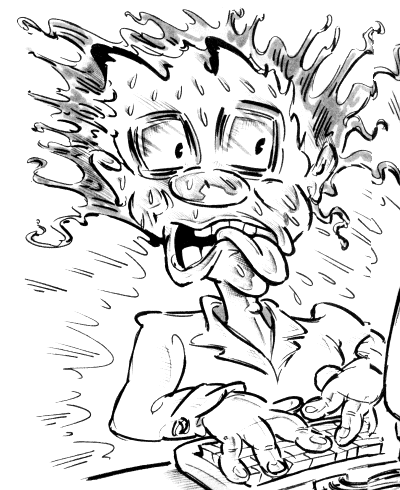| Computer Crazy |
 |

A doctor reveals that playing too many computer games turns you into a raving psychopath. Well does it? Are you crazy? Wendie Pearson tells you the symptoms
HAVE YOU ever read headlines such as 'Psychiatrist warns on computer addiction' or 'Video games drama may take its toll'?
Too much time spent zapping aliens, or even programming, may be bad for you. Is there really a dark side to computer games? Should arcade games carry a health warning? Read on ...
Dr Prem Mizra - a consultant pyschiatrist at Duke Street Hospital, Glasgow - has treated teenagers and adults suffering from computer addiction. "They became badly disturbed after computers took over their lives," says Mizra.
His first patients were all teenage boys. They suffered nightmares, illusions, excessive daydreaming and exhaustion from computer addiction.
"One boy became psychotic - in other words he started to lose control of his mind, but he is nearly cured now, having reduced the amount of time he spends on the computer," says Mizra.
He finds that some teenagers spend up to 12 hours a day programming and playing games. Computers are the most important thing in their lives, and they imagine that computers have minds of their own and can talk to them.
Dr Mizra stresses that each victim of this syndrome is male, of above average intelligence, sociable and articulate. Each one enjoys programming as well as playing games, and none have any prior history of antisocial behaviour. Contrary to popular belief, the problem is caused by use of the computer and not by some imbalance in somebody's head.
"The dependence on the computer isn't hard to break, but the time spent on it must be reduced," he says. "For some people, two or three hours a day is recommended while others might cope with four or five."
Dr Mizra does not recommend that parents should suddenly remove a computer as that can be very traumatic, but he believes that computer time should be reduced for anyone who has become too dependent.
"Frustrated, thwarted and |
"Parents don't realise that once they've gone to sleep, their son has turned his light back on and started working on his computer. They are largely unaware of what is going on," he says.
If you suffer symptoms such as those described by Dr Mizra, it seems that you can expect little sympathy from those in authority.
We approached Mary Whitehouse's crowd - the National Viewers & Listeners Association - bearing in mind their apparent concern about what is shown on the nation's TV screens. But it appears that while they concern themselves with TV programmes, they aren't remotely interested in computer programs.
Although aggressive games and software nasties aren't seen by the experts as an immediate threat to players' mental health, the cumulative effects over several years are thought to equal the effects of watching video nasties over an equal number of months, in that a lack of control over aggressive impulses is experienced by some viewers.
The saving grace of computer games seems to be that the quality of graphics is nowhere near the sort of picture you receive on your TV. One 16-year-old games player says, "With the introduction of machines such as Commodore's Amiga, with graphics so life-like that they aren't far off the sort of thing you get on TV, violence in games might be more of a problem."
In the States a pressure group has been formed to campaign against Dungeons & Dragons games. BAD - Bothered about Dungeons & Dragons, based in Virginia, was founded by Pat Pulling, a mother who feels the game was responsible for her child's suicide.
Critics over there feel that the game encourages suicide by impressionable young people as the only way to ultimately win the game, and a row erupted this year over two Denver boys who killed themselves in a suicide pact in 1984.
A police detective investigating their deaths said he thought their involvement in Dungeons & Dragons led to their actions. The officer then retracted his statement when a games manufacturer threatened him with legal action.
Keith Ollett, of the organisation Play for Life, is cautious about the story, but says: "The suicide element, if true, is tragic and reminds me of the copycat killings linked to TV."
Dr Mizra's first patients |
The organisation, based in Crowborough, East Sussex, encourages more creative and constructive play for children. "Whether you approve of computer play or not, it's an important part of children's playing experience so there's no point in saying it's a bad thing. But the violence in games is very disturbing because it trivialises and personalises death. It's you that gets killed in the game, so it devalues the whole concept of life. I'm not sure that playing Space Invaders turns you into a mindless psychopath, but I do feel that if you concentrate on aggressive, assertive play, you limit your choice of responses in everyday life. And play is rehearsal for life."
Ollett is concerned that parents often don't know what their children are playing with. Parents may think a child is doing homework on the computer, while homework may be losing out to games.
London-based psychologist James Hemming also gives his views on computer games. "I'm all in favour of children playing with computers," he says, "but I think the computer games revolution is not entirely a good thing. The time children spend pressing buttons could be spent making or doing things. Computer games can become too dominant in a child's life unlike games like Ludo which can be put away in a cupboard.
"I would like to see computers deal with more real and practical issues than just blowing things out of the sky. It's perpetual fantasy - it isn't realistic.
"Frustrated, thwarted and angry people find the games help them to be violent in a safe sort of way - so the games serve as a track for unexpressed violence. However, the problem is that people can regard violence as just a plaything; that is the problem with violent imagery. It trivialises violence - and violence isn't trivial.

"These games may make you less sensitive about violence, and eventually the violence becomes acceptable. Playing with violence makes it look as though it doesn't matter, and if cruelty is an everyday affair, people stop observing it and valuing it correctly."
Hemming says some games give children an unreal sense of power which distorts their viewpoint, quite aside from the fact that computing is a spectator sport.
He also has some interesting points about the essentially male nature of game playing. "The male has the need to demonstrate power and if he can make tremendous things happen just by pressing a button then he is given a fantasy of power.
"That sort of activity is particularly appealing to the less successful kind of males you find in amusement arcades. That kind of man is given an illusion of power through huge numbers which appear on the screen, loud noises and bright lights, which make him look important. But anyone desperate to show his superiority is actually showing his weakness."
Nightmares are another problem associated with computer games. Hemming comments: "Children of imaginative age can suffer nightmares - there is the likelihood that these games turn on the horror in the imagination which will result in nightmares."
Misgivings about computer games aren't new, however. Back in 1983 the US Surgeon General - better known for putting health warnings on cigarette packs - warned of the dangers of excessive exposure to video and computer games, and in countries such as Singapore and Malaysia, public use of Space Invader games is banned by law. However, at that time, Dr Robert Olton, manager of behavioural research at Atari's video games division, played down the warnings, although he did admit that "certain children do develop a very intense relationship with the screen," whatever that means.
It seems that people who play in the seclusion of their bedrooms for many hours each day are at the most risk of computer dependency. Friendships, social life and homework are likely to suffer from excessive computer use, and anyone who already has an obsessional personality could come a cropper.
"You make a habit of not |
Neil Wilkinson, 16, says his schoolwork has suffered drastically. "I never have time to do any because I'm too busy poking at a keyboard," he says. "I had a few hobbies before I started and I have even less now."
Neil doesn't go along with the idea that violent games can desensitise you, although he admits to going a little loopy not long ago. "You can become obsessed. You start thinking that everything you do in life is like a computer program. For instance, if I was on a bus that was going too slowly, I started thinking I could change the variable in the program to make it go faster. Honest! And other people do worry about you, that you're in your room playing on computers all the time.
"Your social activity does suffer and this might affect you later on, but you don't realise this at the time. You may have few friends, and say you don't mind about that, but you do really. You make a habit of not dealing with people, saying 'Who cares about people when I have my Spectrum upstairs?'."
Kieran Kelsdon, 14-year-old Atari player, has also seen his hobbies diminish since he discovered the micro. He reckons that some of his mates have become quite boring since they started playing games. "The games are all they talk about," he says.
On the subject of aggression in games, he says: "They don't incite me to go out with a high powered laser and kill people. If the graphics were really realistic, it might affect some people, but right now they aren't that advanced. When you zap something on a screen you don't think of it in terms of killing."